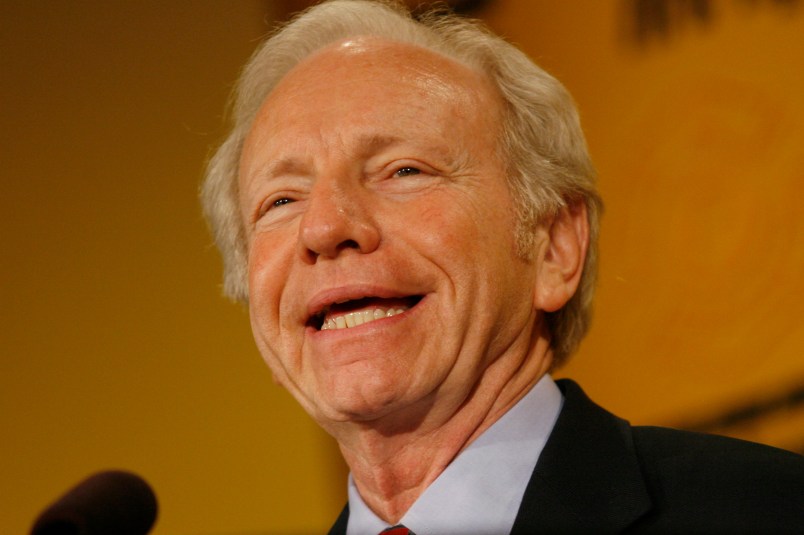Sen. Joe Lieberman (I-CT) appeared on MSNBC Thursday afternoon, and made a bold pronouncement on the political debates surrounding the interrogation of Umar Farouk Abdulmutallab, the suspect in the attempted bombing of Flight 253: That critics of the White House should not be accused of aiding al-Qaeda.
The catch here is that during the Bush years, Lieberman himself made some similar comments about critics of the Iraq War — saying that when they attacked the Bush administration they were harming America, or helping al-Qaeda, or attacking America’s allies.
Yesterday on MSNBC, Lieberman said just the opposite of his earlier position. “I just think we’re into a bad cycle here. I have a lot of respect for John Brennan. I think some of the things he’s said have been provocative and in my opinion inappropriate,” said Lieberman. “You can have a difference of opinion about how the Christmas-Day Bomber should have been treated without turning it into a political debate or suggesting that anybody who doesn’t agree with the way the administration handled the Christmas-Day Bomber is somehow giving aid and comfort to al-Qaeda. Nobody here wants to do that or is doing that. I think we’d all say that what we’re trying to do is in fact protect the homeland security of the American people against al-Qaeda.”
Lieberman was referring to a recent USA Today column in which Deputy National Security Adviser John Brennan declared: “Politically motivated criticism and unfounded fear-mongering only serve the goals of al-Qaeda. Terrorists are not 100-feet tall. Nor do they deserve the abject fear they seek to instill.”
Here are just four examples of Lieberman’s prior position on accusing White House critics of helping al-Qaeda:
⢠Lieberman raised this issue in a November 2005 guest column in the Wall Street Journal: “After a Thanksgiving meal with a great group of Marines at Camp Fallujah in western Iraq, I asked their commander whether the morale of his troops had been hurt by the growing public dissent in America over the war in Iraq. His answer was insightful, instructive and inspirational: ‘I would guess that if the opposition and division at home go on a lot longer and get a lot deeper it might have some effect, but, Senator, my Marines are motivated by their devotion to each other and the cause, not by political debates.'”
⢠In December 2005, Lieberman famously declared in a speech: “The distrust is deep and I know it will be difficult to overcome, but history will judge us harshly if we do not stretch across the divide of distrust to join together to complete our mission successfully in Iraq. It’s time for Democrats who distrust President Bush to acknowledge that he will be the commander in chief for three more critical years, and that in matters of war, we undermine presidential credibility at our nation’s peril.” (Via Nexis.)
⢠In April 2007, in a Washington Post guest column, Lieberman said: “When politicians here declare that Iraq is ‘lost’ in reaction to al-Qaeda’s terrorist attacks and demand timetables for withdrawal, they are doing exactly what al-Qaeda hopes they will do, although I know that is not their intent.”
⢠In August 2007, he declared: “Forced by facts on the ground to acknowledge the progress of the American and Iraqi militaries since the new surge strategy started, some of these opponents of the war are now turning their harshest criticism on our allies in Iraq instead of our enemies”
We’ve contacted Lieberman’s office for comment on how these situations might be different. They have not gotten back to us at this time.









